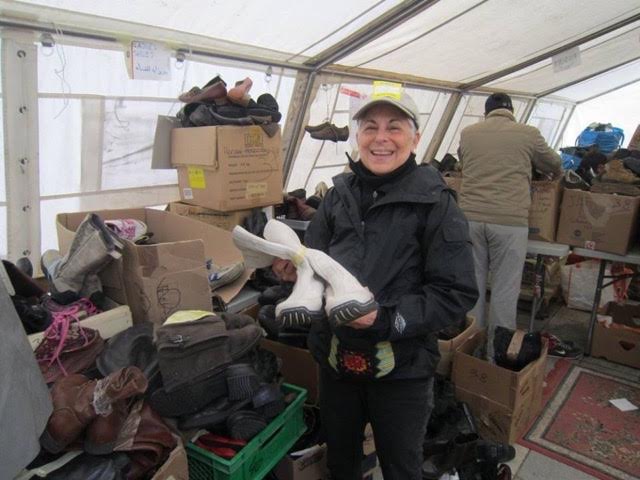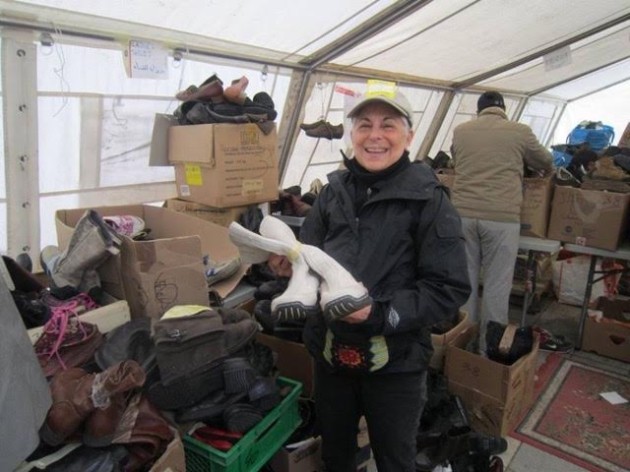
Her Father Escaped Vienna. Now She Returns to Help Syrian Refugees.
Ava is working with me this afternoon sorting clothes because she’s a nurse and conspiracy theorist. In Vienna for a month of emergency-room training at the AKH, the main hospital, she obviously cares about people, but she also believes that Kennedy was killed by the U.S. government and that 9/11 was an attack coordinated by the U.S. military to kill its own. Why? So that the U.S. could institute repressive laws to keep out foreigners. When I challenged her on this horrifying theory, she very patiently explained: “We killed our own here in Europe during World War II – humans everywhere are capable of this. You are naive to think the U.S. is not.” She obviously thinks the worst of humanity and is trying to prove that not everyone – herself included – is bad.
And me, why am I here? Because it felt like a no-brainer to jump on a plane and lend a hand in any way that I could. The older I get, the more interested I seem to become in helping others. Since my adult bat mitzvah five years ago, I’ve instituted a custom each Shabbat during the silent Amidah of running a tally of my good deeds during the previous week. For the first 2-3 years, I was in pretty good shape: as a bat mitzvah project I had set up a program to visit asylees at the Elizabeth Detention Center. In those days (post 9/11!) whenever someone arrived in the U.S. seeking refuge from religious, political, or any kind of persecution, rather than welcoming them, the U.S. threw them into detention at their port of entry. Our group visited them because if they even had one hour of company a week, it broke the monotony and numbness brought on by months of isolation.
Fortunately, the U.S. changed its detention policies and our visitation services were no longer necessary. So for the last few years, I’ve come up short every week on the Shabbat tally. Like Karin, I am blessed to live a life without want. Like Tim, I have my own Holocaust story.
In 1938, five months after the Anschluss (Germany’s annexation of Austria), my father, age 29 and a partner with his father in a margarine factory, learned from an Austrian friend that the Engels of the Sixth District (Vienna is divided into residential districts) were on the SS’ deportation list. As he told the story, my father, Franz Engel (later Francis Elliott), went into his room and didn’t come out until he had devised an escape plan, some three weeks later. The next day they fled Vienna in the dark of night – his parents, his sister and he – slipping over the border to Italy, Switzerland and France. After two years interned in an alien camp in central France, he once again collected his family, eventually shepherding them to Lisbon, where they embarked for the U.S.
I am here today as an individual act – to do everything I can to make sure that today’s refugees are treated much better than my family was. When I tell this to Karin, a native Viennese, she blinks back the tears and rolls up her sleeve to show me her goose bumps.

The author tending to her job in the shoe “store,” a place where refugees came to replace their shoes after weeks on the road.
I am here because I need to see and believe that Vienna and the Viennese have changed. With the possible exception of my conspiracy-theorist co-worker, it has been a good start. I spent the day with people who care about people – people who have heart (both the English word, “care,” and “Caritas,” the Catholic charity come from the Latin for “heart”). I spent the day surrounded by Austrians of all ages who gave up their Sunday to hand out food and sort clothes. And, I got to see the never ending line of people driving up to the Caritas donation site to contribute yet another baby onesie or boy’s winter coat to the nearly unmanageable mounds of clothing already collected.
Late this afternoon, after a day of sorting infant wear – and frequently cooing at the adorable, beautiful clothes good Austrians have donated – I walked back to my rented studio, no more than a kilometer from the apartment my family fled in 1938.
I am here as their witness, to be present, to help. Hineni.
For the next week, as I walk the streets my father once walked, in my own tiny way, I will try to bring the Viennese refugee story full circle from 1938 to 2015.
For more of Roberta Elliott’s experiences in Vienna, watch for the Winter 2015-16 issue of Lilith.



